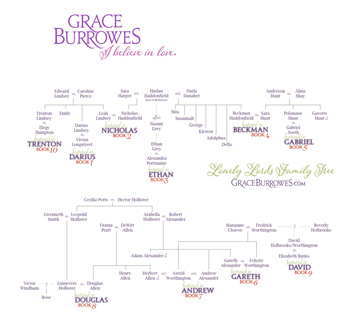Andrew
Lord of Despair
Book 7 in the Lonely Lords series
Andrew Alexander, Earl of Greymoor, has tried to run both from memories of a boating tragedy that claimed the lives of several loved ones, and from an attraction to pretty, petite, Astrid Worthington. He returns to England to find Astrid widowed, expecting a child, and more irresistibly attractive to him than ever. When it becomes apparent that Astrid needs a husband who can keep her and her unborn child safe, Andrew must decide if old nightmares will continue to control his life, or if his love for Astrid entitles him to a second chance at happiness—and love.
Bonus Materials →
Enjoy An Excerpt







Chapter One
I will not run from the sight of my brother’s front door—I hope.
Andrew Alexander’s composure felt as tentative as if he were facing another Channel crossing under stormy skies, though he nonetheless rapped the lion’s head knocker stoutly three times against its brass fitting.
“Have you a card, sir?” The butler posed his question with that precise blend of hauteur and deference appropriate in the household of an English marquess.
“I’m afraid you have me at loss,” Andrew replied. “My cards went missing somewhere between the Levant and Gibraltar.” He’d pitched them overboard at a point in his wanderings when he’d been so homesick, that despite all his misgivings, despite the sea voyages involved, and despite the prospect of renewed proximity to Astrid Worthington, he’d turned his sights for England.
Not Astrid Worthington. Astrid Allen, Viscountess Amery.
Andrew had something better than calling cards, however. He had a pair of dark eyebrows, which when lifted at a certain angle over eyes of a particularly brilliant blue, proclaimed him—to those possessed of a modicum of perspicacity—the younger sibling of the marquess.
The butler apparently numbered among such noticing souls. “My apologies, my lord. I will see if the family is receiv—Lord Andrew?”
Andrew assayed a smile, though he did not recognize this man.
“It’s Hodges, your lordship. I was the newly hired underbutler when you left on your travels four years ago. Welcome home! Welcome home, my lord!” The fellow—whom Andrew still did not recognize—was bowing so enthusiastically his wig nearly came down over his ginger brows.
“Thank you, Hodges. It’s good to be home.” Andrew had rehearsed that very line, and thought it came out rather well.
To be on dry land was always good. Always.
“Lord Heathgate has been on a tear ever since we got your letter, my lord,” Hodges declared as he divested Andrew of hat and gloves. “Her ladyship, too. Please do come along. The master is in his library.”
Hodges bustled down the hallway, while Andrew sustained a sensory blow that had to do with the scent of beeswax and lemon oil, the sight of red roses in a silver bowl on the side table, and the jingle of a passing carriage.
He was as much at home as he was ever going to be.
Hodges tapped three times on the library door, a small sound that guaranteed for a while, at least, Andrew would remain at home.
“We’ll surprise him, eh, your lordship? And I’ll let the marchioness know the happy news.” Hodges was fair to bursting out of his silver and blue livery to tell Heathgate’s lady that the prodigal was home, while Andrew felt a sense of frigid waves closing over his head and brine filling his belly.
Though beneath those reactions also dwelled a stubborn joy. Andrew seized the joy with both hands as Hodges announced, “a visitor,” then promptly dropped it when he found himself standing in his brother’s library.
“You’ll have him to yourself,” Hodges whispered with a cheeky wink.
Which was exactly what Andrew did not want.
Will he, nil he, the door clicked quietly shut. Andrew’s only surviving brother stood in quarter profile by a set of French doors that led out to the back gardens. Gareth looked the same, no gray in his sable hair, no age creeping into his face, no dimming of his icy blue eyes. If anything, the man looked… younger, and the sight of him hale and whole comforted unbearably.
Gareth shot across the room and enveloped Andrew in a silent embrace, as a queer feeling suffused Andrew’s chest, then his whole body, a kind of chill and heat that left him weak-kneed and resting his forehead against Gareth’s shoulder. He did not deserve this unseemly display, but he held fiercely to his brother a moment longer.
“Squeeze me any harder and you will make me cry,” he said, stepping back when Gareth’s hold eased. A boyhood taunt between brothers was nothing less than the God’s honest truth now. Andrew tried for a smile—and mostly failed.
“You have damned near made your brother cry,” Gareth growled. “God’s balls, you’re skinny. Between Felicity and Mother, you will soon be fat as a market hog.” He went to the sideboard and gestured with a decanter. “A celebratory tot?”
Andrew avoided strong drink as a matter of course, particularly whiskey, because it—along with sea voyages and introductions to any woman named Julia—seemed to fuel the nightmares.
“Of course,” Andrew said, still feeling strangely weak. “Brandy will do. I have missed your cellar.” He had missed his brother far more. He propped himself against Gareth’s huge desk in what he hoped was a nonchalant pose. “We can drink to the health of your lady. Your last letter said Felicity is once again blooming, to use your words, in anticipation of a happy event.”
Given her condition, Andrew would need the fortification of his drink before he saw his sister-in-law again.
“She does the blooming, I do the anticipating,” Gareth said, handing his brother a bumper of brandy and clinking his glass against it. “To homecomings.”
“And your wife’s continued good health,” Andrew countered, raising his glass. The taste of Gareth’s bribing stock was more proof of homecoming, the brandy smooth, fruity, and subtly complex. Andrew sipped once and set his glass aside. “You do serve the very best.”
“Only to my most honored guests,” Gareth shot back. “Do you know, Andrew, how badly I have missed you? Worse than that, Felicity missed you, and Mother missed you, perhaps more than all of us put together.”
Astrid had missed him too. She’d put that in writing a time or two, and Andrew still had those notes.
“And how fares our good dame?” Andrew rejoined. Yes, he’d missed them as well, and he’d been gone too long—and not nearly long enough. On that thought, he sank into the comfortable depths of Gareth’s sofa.
Gareth appropriated an armchair, looking very much lord of the manor. “Mother is well, having had great fun shepherding Astrid through two seasons and a wedding. We’ve also had the sense to present her ladyship with perfect, brilliant, adorable, et cetera grandchildren whose precociousness flatters her endlessly. With another—at least—on the way, her cup runneth over. Seeing you, however, will make her truly happy, and not simply busy with other people’s happiness.”
Something in that litany—besides the casual mention of Astrid’s name—caught Andrew’s ear. “Is Felicity expecting twins, then?”
“I hope to God not,” Gareth said. “Astrid intimated to Felicity right before the funeral that she may be increasing as well. Felicity hasn’t wanted to question her about it in light of her bereavement, but we’re hopeful she will have that consolation at least.”
Andrew turned a hard stare on his brother, feeling internal upset lurch toward complete chaos. “Gareth, what are you talking about? What funeral, what bereavement?”
Gareth set down his glass on the stones of the raised hearth. “I sent a letter to intercept you at Gravesend and another to our office at the Pool, but I gather neither one reached you. Astrid’s husband was killed in a hunting accident two weeks ago. She stayed here for the first week, but was determined to return to her own household thereafter.”
“This is unhappy news,” Andrew managed. Damned rotten, unhappy news. “Sad for Astrid.” Tragic, if she’d loved her husband, and Andrew fervently hoped she had.
And not at all convenient for him. He battled the impulse to get off the couch, walk out the door, and up the gangplank of the nearest departing ship. Astrid—lovely, dauntless Astrid—was alone, grieving, and possibly expecting her late husband’s heir. Could there be a less felicitous set of circumstances?
“How does Astrid fare?” He couldn’t keep that question behind his teeth for all the calm Channel crossings in history.
“I don’t know, Andrew,” Gareth said, and those were not words the Marquess of Heathgate uttered frequently. “She’s young, and she’s sturdy in her own way. Her brother, David, is keeping a close eye on her, but I get the sense she’s not grieving well. Felicity claims her sister has yet to shed a tear on her late husband’s behalf.”
Andrew considered Gareth’s words rather than consider the unlocked French doors. David, Lord Fairly, was an astute man and a conscientious brother, and that was some consolation. “She loved her husband?”
He should not have asked; he should never have even wondered. Astrid’s domestic affairs were none of his business, and they never would be.
“I think that’s part of the problem.” Gareth rose and refilled his glass with a half measure. “She was fond of him, but Fairly and I, and Felicity too, were puzzled by her choice of him. Amery was a great puppy dog of a fellow, jovial, doting, and without intellectual pretensions. Astrid played him like a fiddle, if you ask me, but I couldn’t figure out why she’d chosen him in the first place. I don’t find boredom much of an aphrodisiac,” Gareth concluded, resuming his seat.
Andrew had forgotten how frank his brother could be—and how perceptive.
“Astrid’s father was a bounder, and her brother is an odd duck. That she’d want a steadier sort for the father of her children makes sense.” A steadier sort than he, of course. Andrew had told himself this through twelve countries and three sea voyages. He’d told himself this when he’d been unable to burn the notes she tucked into his brother’s letters, and told himself this again when her notes had stopped coming.
“You may have the right of it.” Gareth might have intended to say more, but he was interrupted by a knock on the door.
“Gareth? Andrew?” Felicity, Marchioness of Heathgate, came in sporting a fulsome smile and suspiciously bright eyes—also carrying a silver tea tray which she set on the table in front of the sofa. For a progression of moments, Andrew experienced a resurgence of joy mixed with unease as Felicity fussed, hugged him, dabbed at her eyes, and fussed some more.
And her ladyship was visibly gravid, which did nothing for Andrew’s nerves.
She ensconced herself next to Andrew, right next to him, in the friendliness Andrew associated with both Worthington sisters.
“Are you interrogating my brother-in-law, sir?” she asked her husband. “I won’t have it. That prerogative is reserved for females, among whom you do not number. Who would like tea?”
Gareth returned her smile, his saturnine features acquiring a softness when he beheld his wife. “None for me, sweetheart, I’m drinking the good stuff.”
“None for me either, sweetheart,” Andrew said. “I’m drinking Heathgate’s good stuff, which I have sorely missed.” He had not missed the little lies Polite Society required in the name of manners, but he could hardly say he’d missed his brother to a point approaching lunacy.
“Leaving the entire pot for me,” the marchioness said. “While the tea is steeping, would anyone like a sandwich?”
Andrew considered the question and realized that with the anticipation of this homecoming behind him, he was starving. He accepted a heaping plate—two sandwiches of sliced beef and cheddar on white bread with a pale French mustard—and caught the look Felicity exchanged with Gareth. Their brief glance was domestic, a bit of wifely smugness at having guessed correctly at Andrew’s appetite.
“Eat all that,” Gareth remarked, “and we will have to change your title to Earl of Shoat. I wouldn’t mind a sandwich myself, Wife, if there are any left, that is.”
“Now, children,” Andrew chided between bites of simple, English food. “I will eat as much of this delicious fare as I may, and would appreciate it if we did not apply any titles to me, even in jest.”
Another look passed between Gareth and Felicity, but it wasn’t domestic or smug. Felicity was puzzled, and Gareth was… uneasy.
“What?” Andrew asked, pausing with a sandwich halfway to his mouth. Astrid was now widowed, possibly an expecting widow. What development could be more disconcerting than that?
Gareth appeared to find his sandwich fascinating. “You do have a title, or two, actually.”
Foreboding settled into Andrew’s stomach, swirling about in a queasy mess with his brandy, his half-eaten sandwich, and the upheaval of Gareth’s various disclosures.
“What do you mean, I have a title, or two—actually?”
“You will recall our maternal grandfather was a baron,” Gareth began. “But you may not recall he had a second cousin who was Earl of Greymoor. The earl died without surviving issue, and after some roundaboutation, that title devolved to grandfather the year before his death. He made nothing of it, and I wasn’t even aware it had happened until I was tidying up his estate and cousin Gwen informed me. By then, Privileges was looking about for someone to foist the barony and the earldom onto. Because I am already overburdened with titles, they saw to a special remainder, or a reissuance of the letters patent, something of that sort—it was one of those titles that could be preserved through the female line—and settled the honor on you.”
Andrew shot out of his chair and whirled on his brother, who was very likely the something of that sort responsible for this fiasco.
“How could you let that happen, Gareth? I trusted you to watch my back while I was gone, and I come back to this? I want no titles, do you understand? Privileges will have to look about for someone else to honor, but it won’t be me.”
The damned man remained seated, regarding his wife, then his glass of spirits, when what Andrew wanted was the sort of set-to they’d indulged in as adolescents, before the accident had made them so blessed careful with each other.
“I knew you’d resent this,” Gareth said. “If you don’t want to administer the estates, we can hire a steward or two. The titles need not burden you, Andrew.”
Felicity’s expression was worried so Andrew forced himself to sit back down beside her.
“You will pardon my lack of manners, Felicity,” he said. “I do not mind the burden of the estates, Gareth.” Not much. Not yet, though he would and soon. “The burden of the succession is the untenable obligation.” He managed a sip of brandy and tried to batten down his anger—his panic, to apply the more honest term.
Felicity put two frosted tea cakes, one pink and one blue, on his already full plate. “You needn’t worry about the succession, Andrew. Your nephews can inherit if all else fails. Would you like to meet them?”
Nephews. Never did a word bring a greater sense of relief. God bless all nephews, the more the better. “I would like very much to meet them, and I’m warning you both now, I will spoil them rotten every chance I get.”
And guard their lives with his own.
![]()
The clock ticked in the otherwise silent house.
And ticked.
And ticked.
And ticked.
Sitting in her front parlor, a cup of tea growing cold in her hands, Astrid Worthington Allen, newly widowed Viscountess Amery, considered getting up, crossing the room, and pitching the clock through the window.
She contemplated this maneuver with the small, detached part of her mind still capable of ratiocination. The clock was safe, of course. Smashing it would take action, and action took willpower, and Astrid had used up the available quotient of that precious commodity dressing and getting down to this sitting room. Most of her, however, was still upstairs in bed, unwilling to face another day.
In the privacy of one’s thoughts, one could be brutally honest: she was all but unable to face another day.
That bluff, genial Amery had died in his thirtieth year was unfair. Not fair to Amery, and most assuredly not fair to Astrid. She had loved her husband, truly she had. He had been—oh, how the pluperfect tense oppressed!—he’d been a pleasant, harmless young man. Not strikingly handsome, not particularly quick, not flashy in any sense. But she’d chosen him for that very solid, undramatic, pleasant quality… and now this.
Every corner of the house held memories of Herbert, every space had a deserted quality, where he should still be sitting, standing, laughing, lounging with a drink, or tracking mud. Herbert had tracked a deal of mud, never caring for the carpets when he’d come in from a hard ride or a morning’s shooting.
Astrid had hoped they could become friends, in time. But they weren’t to have time. No more time at all.
Out in the hallway, voices sounded. Astrid recognized not the words but the smooth, quiet cadence of Douglas Allen’s greeting and instructions to the footman. As the present Viscount Amery, Douglas could do that—order Astrid’s staff about, visit any time he chose, and generally intrude on her grief with the best of stated intentions.
Between one tick of the infernal clock and the next, energy suffused Astrid in mind and body.
Douglas could interrogate the staff all he wanted, but Astrid could not bear the prospect of him oozing cool sympathy while his chilly blue eyes gave away no grief of his own.
Not today.
Before Douglas could finish his interrogation—for Astrid had no doubt he was again questioning the staff about her daily habits—she slipped out the parlor’s side door and kept walking, toward the back of the domicile in which she’d been entombed.
She grabbed a black cloak and a heavily veiled black bonnet from the hooks in the back hallway, finding them appropriate, not to her grief, but to her anger.
Amery should not have died as he did.
He should not have left Astrid alone to bring a child into the world, not after last year’s miscarriage.
And he most assuredly should not have left Douglas with the authority and assets of the viscountcy.
Astrid fairly charged out into the mews and called for her coach while she tried to think of where she might go to be alone with her anger and with the endless, painful lump in her throat that would not turn into tears.
![]()
When she let herself into the kitchen of her girlhood home, Astrid saw that the Crabbles were taking very good care of the place, indeed. Not one corner sported a cobweb, not one surface a speck of dust, not one carpet was need of a thorough beating. The whole house, in fact, lacked the hollow, empty feeling Astrid had expected as she made her way up to the attics.
The state of the house, the dearness of it, cheered her considerably.
Astrid found the appropriate trunk immediately. The latch was sticky, and when she opened the lid, camphor and lavender assailed her nose. Taking off her bonnet and gloves, she knelt before the trunk.
A lace-attired doll she remembered from her earliest childhood was the first thing she enountered, followed by very small dresses. Toward the bottom of the trunk, she found even smaller clothes, as well as a soft wool receiving blanket with mock orange boughs beautifully embroidered on the borders. The sight of it, something her own mother had made while carrying her, brought tears to Astrid’s eyes.
Mock orange symbolized memory, and of her late mother, she had none.
Finally tears, for a mother she’d never met, who had loved her before she’d even been born. The thought caused an upwelling of sorrow, a flood of misery that had Astrid crying noisily into the blanket. She didn’t know how long she remained kneeling on the floor, crying like a motherless child, but eventually she became aware she wasn’t alone.
Hands settled gently on her shoulders.
“Astrid.” The voice was masculine and dear to her, but what Astrid responded to was the wealth of caring she heard, even in just her name. “Astrid, hush.” A pair of strong arms turned her and scooped her up, then settled her against a broad masculine chest.
Andrew. Andrew was home, he was here, and why that should be she could not fathom, though she knew without reservation, she was glad of it.
“I want my mother,” she confessed miserably, clinging to the comforting embrace. She heard no reply, though her admission had intensified her sense of loss and expanded it to include the child she’d conceived and then lost the previous year. If she’d had to choose, she would have said she was crying more for her mother and baby than for her departed husband.
Comforting hands caressed her back; gentle fingers stroked her hair; soft lips pressed to her temple. The great knot of pain inside her gradually eased under the onslaught of tenderness, and she was able to take the first deep breath she’d inhaled in weeks. Without looking up, she traced her fingers along the strong jaw of the man who held her.
He’d have the same dark hair, the same blue, blue eyes, the same charming, even tender smile.
“Andrew… Oh, Andrew. My dear, dear friend,” she murmured against his chest. “I have been so worried for you.”
Chapter Two
Andrew held the slight woman in his arms securely, but even as his heart ached for her, he felt a growing sense of consternation. Astrid wasn’t going to berate him for departing from England without taking a proper leave of her. She wasn’t going to castigate him for never acknowledging her letters. She wasn’t going to scramble off his lap and huff out of the room in a cloud of sorely tried dignity.
She was going to let him hold her and torture himself with the feel and scent and reality of her.
And he was, just this one more time, going to take advantage of her generosity. Had Andrew known borrowing the unoccupied Worthington domicile would result in this encounter with Astrid, he would have slept in the street instead. His own town house was still in use by tenants, though, and Felicity and Gareth had insisted.
He let out a breath, then inhaled Astrid’s scent on the next in-breath. She felt smaller than ever in his embrace, though she still had the same thick masses of blond hair, the same luscious, rosy scent.
“Having a good cry, are we?”
“You seem fated to come upon me in moments of weakness,” Astrid replied. She referred to the first time they’d met, when Andrew had accompanied his brother to the Worthington household in the aftermath of a potentially deadly fire. “And yes, I would say that undignified display qualifies as a good cry.” She paused on a shuddery breath. “I haven’t yet, you know… Cried, that is, until now.”
Astrid had ever been one to posit confidences and trust where they had not been earned.
Andrew shifted her against the arms of the rocking chair and loosened his neckcloth. He handed it to her in lieu of a handkerchief, then resettled her in his lap.
“You fear if you start crying, you won’t ever stop.”
Astrid looked up at him, the expression in her great blue eyes arrested. “I might have feared that, Andrew, but I couldn’t make the tears come. I was feeling things, but not experiencing my own feelings, if that’s possible. Though just now, I found this blanket my mother made for me before I was born. I killed her, truth be known. She died right after giving birth to me. I’ve never missed her more than I do right now.”
Andrew set the chair to gently rocking again and cradled her silently in his embrace for long moments. She remained peacefully in his arms, a boon he didn’t deserve and shouldn’t want.
“Tell me about your husband.” He chose this question deliberately, hoping a grief-stricken recounting of Astrid’s love for the man might be adequate penance for the liberties Andrew took.
“Amery was a decent fellow,” she began, her tone as prosaic as if she’d been discussing a stable mouser sent to his reward by a passing beer wagon. “He was pleasant and easy to be with. Undemanding, tolerant, affectionate to hounds and horses, and patient with the elderly. I loved him.” She fell silent, though Andrew heard the self-doubt in her voice. “Most of the time, I liked him as well. I hoped we would grow close as our marriage matured.”
This was not going to help Andrew one bit, for clearly, Astrid had not been in love with her husband. The thought disappointed and pleased at the same time.
“You respected him.”
“Mostly, though he also had a… he could be unimpressive,” Astrid said, fingering the border of the receiving blanket. “Herbert wanted everybody to get along, and sometimes that isn’t possible. Confrontation can be a good thing, but not among the Allens. That was hard for me, not speaking my mind ever, not being able to discuss difficult matters even with my own spouse.”
Hard for her? She’d described her version of hell, and made it sound convincingly trivial. But what to say?
“I think most couples find the first few years of marriage a challenge. Learning how to communicate with one’s spouse takes time.” Though what Andrew knew about marriage could fill a small thimble, and that gained mostly from his dealings with wives more vocal than faithful.
Astrid blew a stray lock of hair off her forehead. “Not for your brother and my sister. Have you seen how those two look at each other?”
“It’s nauseating,” Andrew agreed, speaking more literally than Astrid could know. “Also dear. Have you considered making your household with them, Astrid? I don’t like to think of you alone.”
She folded the blanket on her lap, a soft pile of pale wool with embroidered satin borders. “I honestly could not stand to live with those two right now, much less the demon brats who are our nephews. I haven’t the energy to deal with a happy family and their well-intended concern.”
“Speaking of concern, you feel skinny to me, Astrid. When was the last time you ate?” How easily they reverted to simple honesty with each other, something Andrew had missed more than the very shores of England.
She folded his cravat—now hopelessly wrinkled—on top of the blanket.
“That long?” Andrew answered himself. “I find myself in want of sustenance, so you are invited to raid the kitchen with me.” He didn’t move to rise out of the chair until Astrid had scrambled off his lap, but when he saw she was unsteady on her feet, he stood and secured an arm around her waist.
“Astrid—” Women could be carried off by grief, and she weighed less than thistledown.
“Don’t scold me, please, Andrew. I am simply lightheaded. I don’t sleep so well, and I haven’t much appetite, is all. I’ll be right enough when I get some food in me.”
“I’ll send a maid up here to tidy up. Would you like the trunk taken over to your house?” he offered as he ushered her out of the room. He took care to walk slowly and kept his arm around her as they traveled down three flights of stairs to the kitchen.
And Astrid allowed this familiarity, when Andrew knew she shouldn’t. She ought to slap his face and deliver the blistering lecture he had coming after four years of larking around anywhere but where she was.
“Don’t send the trunk over just yet,” Astrid told him as they progressed through the house. “It’s safe enough here, and Felicity may not have a girl, despite Gareth’s autocratic pronouncements.”
Maybe not so honest after all; though it occurred to Andrew he was in the presence of an expecting female, and for once not the least bit upset by it. “You were on a mission for your sister?”
She paused at the top of the last flight of stairs. “I could tell you I was, Andrew, but the truth is I have reason to believe I might be increasing. I am hesitant to share this news, however, because I’ve already had one disappointment, and it would not be fair to Amery’s family to get their hopes up.”
He’d heard about the miscarriage—a half a sentence in one of Gareth’s letters, a half sentence Andrew had reread and reread, between prayers for the aggrieved mother.
Andrew turned her by the shoulders to face him. “If you are increasing, you must take special care to eat, to rest, to keep up your strength. You cannot go all day without eating, and all night tossing between the sheets. You know better,” he chided gently.
She ducked out of his grasp and trundled down the steps.
“I tell myself the same thing, Andrew, but in truth I am not sure I want to have this baby—and yes, I know that sentiment is at least eight kinds of blasphemy.”
Astrid could torture him with her physical proximity, and she could torture him with confidences too. “What do you mean?”
“If I present the Allen family with their heir, then I am tied to them for the rest of my life. The new viscount, Douglas, will have the raising of my son—who will depose Douglas as viscount—or the guardianship of my daughter, and Douglas’s views on many things are not entirely consonant with my own. I have tried to like Douglas, but he is a cool… a reserved fellow. He will bear the title with more credibility than Herbert ever did.”
Andrew tucked her hand around his arm and continued walking her toward the kitchen, wondering why nobody—nobody named Gareth—had seen fit to provide him information about this Douglas fellow earlier.
“You know Gareth will take a hand in the upbringing of any child of yours, if you wish it—and probably if you don’t. He can’t help it, and he is a marquess, not a lowly viscount. Then too, I apparently hold the titles of both baron and earl, thanks to my brother’s well-intended, if egregiously misguided machinations. So both of us outrank Amery, and could at least tie up a guardianship in years of knots.”
The idea that he could champion her causes loomed like a worthy penance—and like an excuse to spend time with her.
“True enough, Andrew, but you are not related by blood to my child, and Douglas is. And it isn’t only the thought of being tied to the Allens that daunts me,” she admitted as they reached the kitchen.
Andrew watched as Astrid went about gathering the tea things, setting out bread, butter, cheese, a jar of brandied pears, and cold slices of roast beef. She had been raised in this house and with few servants. This was her kitchen, and the competence of her movements underscored that fact.
“So what else concerns you about your delicate condition?” Andrew asked, getting down mugs for tea and bracing a hip against the sink.
Astrid stopped fussing about and considered the jar of raspberry jam in her left hand. “I never told Amery we could be expecting a child.”
Abruptly, her unshed tears, her dispassion where her husband was concerned, made sense.
“Guilt plagues you. You don’t deserve motherhood because Amery is not here to enjoy fatherhood.”
“Yes.” Astrid glared at him across the kitchen even as another tear trickled down her cheek. “Guilt. I told my sister, and I’ve told you, but I never t-t-told Amery. He would have died happy.”
Andrew was at her side in two strides, his arms around her.
“He would have died happier, perhaps, Astrid, but he also would have died worrying.” Andrew snatched a towel off a rack behind them and handed it to her. Weren’t widows supposed to carry black handkerchief and flourish them at such moments?
“How did your husband die, if I might ask?”
She pushed away from him, to his regret and relief. “He was out shooting with his youngest brother, Henry, and some of their friends. Amery was quite the sportsman. His gun misfired, and he lost too much blood from the resulting injury. He died the same day, before anybody could get word to me, but Douglas assured me Amery did not regain consciousness, and he didn’t suffer. Maybe knowing he had a child would have made a difference, though. Maybe he wouldn’t have gone on that stupid outing, maybe he would have been more careful with his equipment… Maybe, maybe, maybe…”
Astrid checked the strength of the tea three times in two minutes, put the butter away, then took it out again.
“Please sit,” Andrew commanded quietly.
Astrid shot him a glower but did as bid, letting him prepare her a cup of tea.
He filled a plate for her and slid it across the table, while he took the seat on the opposite bench. “You are to eat every bit of that, Astrid, or I will tell Felicity on you, and she will tell Gareth,” he threatened, earning him a slight smile from Astrid.
“She won’t tell him to get me in trouble, of course,” Astrid said, taking a nibble of cheese. “She’ll tell him because she is concerned for me. Gareth won’t be concerned for me, particularly, as he has oft stated faith in my resilience, but he will be irked as the devil I would give his wife cause for worry, and hence the problem will be dealt with.”
She was smiling, and yet her gaze was forlorn. Had the late lord Amery ever been as protective of her as Gareth was of Felicity?
“You must promise me something, Astrid, and I am serious about this. You must promise me to take good care of yourself: to eat, to rest, to get some fresh air and sunshine. You love the out-of-doors. You love the country. I’m sure, if you wanted to spend time at Willowdale, my mother would be happy to go with you. I know you can’t go larking about in Hyde Park, but you also can’t expect to become happy again if you’re shut up alone in your house all day.”
He added a question to emphasize his point. “When was the last time you fed the ducks, groomed a horse, or petted a cat?” He let a pensive silence hang for a few heartbeats before continuing on. “You need to take better care, Astrid, and let this silly guilt go.”
“Silly, is it?”
Good. She’d bristled visibly and audibly.
“Silly,” Andrew said, unwilling to back down until he had her assent. To that end, he resorted to heavy artillery. “The day my brother Adam drowned, he and I had a very unpleasant quarrel. He was a difficult man to quarrel with, probably somewhat like your Amery. Pleasant, kind, cheerful, never met a stranger, that sort of fellow. He, of all people, would not want me to see that quarrel as the sum of our dealings. Amery would want you to be happy—ecstatic even—to be carrying his child.”
The recitation had been unplanned—every mention of that tragic day, however oblique, was unplanned—but it was honest. The day of the yachting accident, he and Adam, for the first time in their lives, had come nigh to blows. Andrew had railed against Gareth’s looming engagement to Julia Ponsonby, and Adam had defended a man’s right to choose his bride. Adam would have forgiven Andrew, eventually. Andrew was almost sure of it.
Astrid looked down into her cup, as if she might see the truth of Andrew’s words in her tea.
“Eat,” he admonished her, though a lecture was damming up behind his teeth, about common sense and responsibility.
About babies being unspeakably precious.
Astrid slid the butter across to him. “Felicity calls me the butter thief. Gareth is every bit as bad.”
“Butter is good for expectant mothers,” Andrew responded. “When are you going to tell this Douglas fellow of your condition?” Because the good viscount deserved to know his title could be snatched from him by a squalling infant less than year hence.
“I don’t want to tell that man anything, Andrew.”
Astrid was forthright and even brusque, but she was seldom truly difficult.
“Has Douglas Allen given offense, Astrid?”
“Good heavens, Andrew, you look quite severe. Why would you ask such a thing?”
Andrew did not resume buttering his bread. “Answer the question.”
“No, Douglas hasn’t given offense, unless you call an awkward kiss on the forehead offense. He did, however, offer to manage my widow’s portion for me, and yesterday reminded me I have use of the dower house at Amery Hall, as well as the use of the town house for as long as I prefer.”
“And you found this offensive?” In truth, it was decent of the man.
“I did, Andrew. Firstly, I am a widow now, and one of the very few benefits of that unhappy state is the freedom to manage my own funds, to transact business, and to make contracts for necessaries. Secondly, I felt somehow that, by insisting I have the town house as long as I pleased, Douglas was hurrying me from it. Thirdly, he is a notably cold man, and any affectionate overture from him, however well intended or proper, makes me uneasy.”
“I recall when affectionate overtures did not make you uneasy at all, Astrid.”
Mistake. Serious, horrendous mistake, and Andrew knew it even as the words were leaving his stupid, gauche, ill-mannered mouth. He had been doing so well, taking on the role of brother-in-law and friend, and then he had to go and bring up their past.
“Ungentlemanly, Andrew,” Astrid said mildly. “I was an inexperienced girl, and you were merely allowing me a taste of where flirtation might lead. Have you any sweets in your kitchen?”
Andrew studied the composed features on the sweet in his kitchen for a moment too long.
He had given her her first kiss; she had appropriated the second. He had, while Gareth and Felicity looked on in tolerant amusement, goaded her into taking her first awkward sips of brandy, he had put his life at risk for her safety, and on one occasion, he had abused her innocence terribly.
And then fled to the Continent rather than risk worse misbehavior, despite having vowed at the age of fifteen never to set foot on a sailing vessel again.
If it was friendship she sought, then despite the cost to him, his friendship she would have. As she swiped her finger over a dab of jam on the edge of her plate, he recalled her question.
“You crave sweets. Felicity sent over some muffins yesterday,” he told her. “She thinks I am too thin and knows this is the staff’s day off, so she sends provisions.”
“You are too thin,” Astrid said, digging through the bread box and locating the bag of muffins. “And you look tired, Andrew. Are you getting adequate rest and food?”
“I’ve gained some weight since returning. My clothes are not so loose, anyway. You are the one who is too slender, Astrid. Trust me on this.”
And he ought to know, having left England haunted by the memory of intimate familiarity with her curves and hollows.
“Seeing as we’re both in want of nutrition, let us have at the muffins, shall we?” she suggested, bringing the whole bag to the table.
“More tea to wash them down with, or can I convince you to drink milk instead?” She’d always favored milk, but she was no longer a young miss fresh from the schoolroom—and, damn the luck, all the prettier for her added maturity.
“A cold cup of milk has some appeal right now, though part of the reason I have lost weight is I am a bit queasy from time to time.”
“You can thank your offspring for that,” Andrew said, pouring the milk from a jug in the pantry and bringing it to her. “And you have to visit the necessary incessantly, have odd cravings for food, and nap at unusual hours.” Her breasts might also be sensitive, though Andrew kept that possibility to himself and repaired to the far side of the table.
Astrid looked momentarily nonplussed. “How in the world do you know all that?”
They were family; she was a widow. The occasional blunt exchange between them wasn’t that far outside the bounds of propriety—he wished.
“My brother, the selfsame saintly man who is now married to your sister, told me not long after I came down from university that increasing women are often available for dalliance, and with their husband’s tacit consent.” He wasn’t willing to say more. The look of fascination on Astrid’s face suggested he’d already said too much.
“You’ve dallied with women who were pregnant?”
No, he had not, but they had certainly offered to dally with him with a regularity that had felt like the fist of fate laid repeatedly and forcefully across his jaw.
“I didn’t dally with the frequency Gareth did, I assure you. I attended a birth once, if you must know. Messy business, but wonderful.” He wanted her to know the wonderful part, even if it meant he embarrassed them both.
Astrid’s hand went to her flat abdomen, and she looked up at Andrew in confusion. “I really am… expecting,” she said, consternation in her voice.
“Which really is wonderful.” He smiled across the table at her and bit into a muffin, lest he betray how earnestly he meant those sentiments. “Drink your milk.”
And yet, he could be glad for her about this, which was reassuring. That he was also jealous as hell of the dear, departed, unimpressive Amery was of no moment.
She drank her milk, and they each polished off a muffin in thoughtful silence. When the remains of the meal were strewn across the table, Andrew rose to put the food away.
“I can help,” Astrid said, standing up with quick purpose, then sitting down just as quickly. “As soon as my head clears.”
“Botheration, Astrid.” Andrew was beside her in an instant, his hand on the back of her neck as he lowered himself to straddle the bench she sat on. He scooted up, so she sat between his spread legs, and gently brought her to lean against his chest.
“Steady,” he admonished, rubbing a hand along her back. “You can’t move too quickly. Even if you aren’t light-headed, the more the child grows, the more it will affect your balance. Catch your breath, and then school yourself to a greater display of dignity.”
He hadn’t meant to scold so thoroughly, but she’d gone as white as some exotic orchid. She subsided against him with uncharacteristic meekness, sending a bolt of alarm through the pleasant torture of holding her against his body.
“Andrew?”
“Hmm?”
“I want you to promise me something,” Astrid said, her ear over his heart.
“I do not make promises lightly.” If he could help it, he did not make them at all.
“Nor do I, Andrew Alexander, though I have promised you to take better care of myself, to eat well, to rest, to groom horses, and whatnot. I would like a promise from you in return.”
He sensed impending doom, which had ever been his fate where she was concerned. “What promise would you have?”
“Don’t leave again until I have this baby?”
She had no right to ask that of him, but Astrid had seldom concerned herself with rights or proprieties. As he marshaled his sound, logical arguments, she marched on.
“Until you came upon me today, I had not cried for my husband because nobody was there to comfort me. I had not even spoken his name to anybody, because nobody asked me about him. I had not eaten a meal in days because nobody shared a meal with me. I had not considered my fatigue and nausea were related to pregnancy because there is no one to discuss it with.”
Andrew resisted the urge to hold her more tightly, and still, she wasn’t finished with her tirade.
“Yes, I could impose on Felicity and Gareth, but I have imposed on them incessantly over the past four years, and particularly the past four weeks. Moreover, Felicity’s condition is as delicate as mine, and she should not be forced to bear my worries. You are good for me, Andrew, and I am asking you not to leave England until this child is born or the pregnancy otherwise ends.”
He was doomed, but then, he’d been doomed for years—for his entire adulthood at least.
“I will not leave England until your child is born. That is the only way your pregnancy will end,” Andrew said, sounding like his imperious older brother. “But England is a big place, Astrid Worthington Allen.”
She nestled against him, making a little sound of contentment, and doom acquired painful new depths.
“You are good for me, Andrew, and knowing you have not gone abroad somewhere to fight bears or charm snakes will help keep my mind at ease.”
He had fought her memory and charmed the occasional willing woman in aid of that battle, only to lose every skirmish. “Astrid, we both know I have also been, on more than one occasion, not good for you at all, and then I left without a word.”
“You had to leave,” Astrid said, “though I do not entirely fathom why. And you are good for me. Do not argue with a lady, Andrew, particularly not at table.”
He fell silent, knowing his next gauntlet of woes had just begun. Astrid was unwilling to face it, but a man who had treated her as Andrew had was not an honorable man. He’d known it at the time, had known it for years before, but she ignored this aspect of him.
She was pregnant, grieving, and exhausted, though she’d probably not even realized that last burden. Even as she leaned against him on the hard bench, she was dozing off. And it was sweet to hold her, sweet to be able to offer her the simple kindnesses of friendship.
Haring off to the four corners of the globe hadn’t solved what was wrong with Andrew. Being a friend to Astrid for the next few months might be closer to the penance he needed to serve, but he wasn’t looking forward to it.
No, he most assuredly was not looking forward to it one bit.
He let her sleep for an hour, until his behind was numb on the bench. She roused then, smiled at him brilliantly, thanked him, and stepped into the coach that would take her back to her solitary residence.
Chapter Three
Douglas Allen apparently enjoyed the entire Allen family complement of tenacity, for Astrid had not been home fifteen minutes when he reappeared at her parlor door.
“Sister.” The new Viscount Amery bowed deeply. “How fare you?”
Herbert’s younger brother—younger by eleven months—was a better-looking copy of the original. Whereas Herbert had been of medium height and his physiognomy merely pleasant, Douglas Allen was above average in height, and his more sharply cast features shaded closer to handsome, though it was a cold variety of handsome. His blue eyes held a depth Herbert’s had lacked, and his wheat-blond hair—unlike Herbert’s—showed no signs of thinning. Astrid had wanted to like Douglas—Herbert had liked him, for the most part—but Douglas took a while to warm up to.
“Douglas.” Astrid offered him a curtsy. “Good of you to come. May I offer you some tea?” Interesting, how normal she could sound, how normally she could act, when her insides were still in riot as a result of time spent with Andrew.
“Tea would be appreciated, my lady, though I can’t stay long. I merely thought to stop by and see how you are getting on.”
Astrid poked her head into the hallway and summoned a footman to fetch them a fresh pot. Returning to the sitting room, she gestured to the couch. “Shall we sit?”
Douglas obliged her by taking the chair flanking the couch, though he courteously waited for her to be seated first.
He was like that. Courteous, deliberate, reserved, and excruciatingly polite. He would make an altogether more convincing viscount than her husband had. As that thought wandered through her head, she became aware, again, of the clock ticking and the violent impulses the sound engendered.
Though in Andrew’s company she’d not felt the least violent.
“I am glad you have stopped by.” She was not glad; she was not unhappy. She was however, in jeopardy of losing her wits. “I’ve considered your comments regarding my continued tenure in this house, and you should know—”
Douglas held up a staying hand before Astrid could tell him her recently decided plans. “You became part of the Allen family the day you accepted my brother’s suit, and I won’t hear talk of your having to move when Herbert’s death is not but a month past. You must stay here as long as you please, comforted by familiar surroundings.”
More than a month. Thirty-four days ago, Douglas had stood in this very room and informed her her spouse of not quite two years had been killed in a shooting accident. She had thanked her brother-in-law politely for bringing her the news, unable to absorb it, but determined not to fall weeping into Douglas’s arms.
As she had into Andrew’s.
“Astrid?” Douglas was looking at her with concern, and Astrid had to focus to pick up the thread of their conversation. Andrew had looked entirely too thin, was the problem.
And entirely too dear.
“I’ve decided to accept my sister’s invitation to join her when she removes to Surrey later this week,” Astrid said, though she’d yet to inform Felicity of this decision. “Though the surroundings here are familiar, they are also rendered… uncomfortable by Herbert’s absence. I don’t think I would miss him quite as painfully were I not so constantly faced with…”
With what? With the fact that she was too young to have the dream of a family of her own taken from her?
With wondering if Douglas had told Herbert’s mistress of her protector’s death? Had anybody told the woman?
Douglas surprised her by taking her hand in his. “Herbert was taken from you too soon, and without any chance for the two of you to make plans for the eventuality of his death. You need not worry—not about money, not about a place to live, not about your security. The dower house at Amery Hall is now yours for your lifetime, and I will be happy to manage your widow’s portion as well.”
Manage her widow’s portion? Astrid no more wanted Douglas handling her finances than she wanted to wear mourning for the next two years, or wanted to remove to the moldering confines of the Amery dower house. She would manage her own finances, thank you very much, or at the very least, consult Gareth or her brother, David, rather than turn one penny over to Douglas.
Astrid blocked out the sound of the ticking clock, murmured platitudes, and had the footman fetch her lavender shawl in hopes the combination of lavender and black with her blond coloring might make Douglas bilious. Two-and-a-half polite eternities passed before Douglas rose and called for his hat, cane, and gloves.
“Thank you for coming by,” she said, trying to appreciate the gesture.
“Your welfare is my concern, Astrid. Should you need anything, you must not hesitate to ask.”
Why did he have to sound like a disapproving headmaster?
“You are kind, Douglas,” she said, glad to be walking him to the door. When she thought she had him on his way, he turned to regard her once more.
“Shall I have the solicitors draw up a power of attorney? I’m sure they could see to it without delay.” His expression was one of polite concern—his expression was often one of polite concern.
“Douglas, it’s too soon for me to think about such things. I know the finances need to be dealt with, but I cannot make myself take such steps yet.”
To her relief, he tapped his hat onto his head.
“If you are not up to making decisions, that is all the more reason to leave troublesome financial details to me. Still, my lady, you must do as you see fit. I will see you before your remove to Surrey, and I’ll have Mother join us.”
“That would be lovely.” It would be hell.
“Perhaps Henry or I will jaunt down to Surrey to check on you, if the weather’s fine? I would, of course, allow my host the courtesy of notice before presuming to visit.”
Astrid didn’t dignify that with a reply, because it was a veiled criticism of her recent visit to the Allen family solicitors. That had been appallingly awkward. Without David glaring at them and making implied threats, Astrid would have gotten nowhere. Even with David’s formidable presence beside her, there had been a goodly quantity of dodging, throat clearing, and paper shuffling.
“I’m sure Heathgate will always open his home to family,” Astrid said, wishing it were not so.
The only time she’d felt a sense of sanctuary since Herbert’s death had been when she’d been wrapped in Andrew Alexander’s arms, hearing his gentle scolds, and breathing in the clean, dear scent of him.
Which meant a remove from Town and the temptations thereof was all the more prudent.
![]()
“Where’s the little widow?” Henry asked after he’d kissed his mother’s cheek.
Urania Dupres Allen, of the Dorchester Dupres, stifled a sigh as her younger surviving son appropriated her favorite chair.
“I did not give you leave to sit, Henry, and I do believe your breath smells of spirits.” His breath reeked exactly as his father’s breath had usually reeked, truth be told.
“Come, Mama, you cannot begrudge me a tot now and then. The Scots prefer to start their day with a wee dram, and they’re a hardier race for it.”
The Scots were also impoverished, uncouth, and impossible to understand. Urania rang for the tea tray, exacting a small vengeance for the disappointment that was her surviving sons, for Henry—again like his father—despised tea. She took a seat away from the sunlight streaming through the window, a lady’s complexion being one of her most important assets.
Particularly a lady of a certain age, particularly a lady with a redhead’s fair skin, who used the occasional very light henna treatment on that hair.
“You asked me about Astrid, but why should I have any notion of her whereabouts? I wasn’t aware she’d started leaving her house yet.” The house that was a deal more comfortable than the pokey establishment Douglas provided for his mother.
Herbert had promised her better quarters as soon as the lease was up. If only dear Herbert had lived…
Henry helped himself to the lemon drops in the candy dish on the side table. “I couldn’t imagine Astrid had anywhere to go except to visit you—or perhaps that sister of hers.”
Astrid had said something about visiting her sister, but hadn’t extended the invitation to include her dear mama-in-law.
Henry’s tone suggested visiting either one’s sister, the marchioness, or one’s mama-in-law, the dowager viscountess, was a dire fate, though why Astrid’s whereabouts were Henry’s business, Urania did not know.
“Must you take three lemon drops at once, Henry?”
He grinned. “First you complain about my breath, then you complain about my efforts to freshen it. How would I go on without your weekly scoldings, dear ma’am?”
The rascal was going to ask her for money, or an introduction, or some favor or other. He set aside his Tuesday mornings to spend time with her, but of his other comings and goings, Urania maintained a determined ignorance. Though he hardly seemed to use them, he maintained rooms closer to the City, and Urania remained in purposeful ignorance of what went on there, too.
“Without my guidance, you would go straight to perdition,” she said. The housekeeper brought in the tea tray, meaning scoldings—and requests for funds—had to wait a few moments. Henry did not rise to take the heavy tray from the older woman, something Douglas, for all his other shortcomings, would have done.
“What do you hear from your brother?” Urania asked as she poured out. She did not give Henry a chance to decline his tea, and skimped on his sugar. Douglas was always prosing on about economies, now, wasn’t he?
“I hear a lament, Mama.” Henry produced a flask from his vest pocket, doctored his tea without so much as a murmured apology, and put the flask away. “I hear from Douglas that the late viscount’s men of business have much to answer for, and that we must be prepared for economies.”
Urania had raised her sons to have the manners of gentlemen, though Herbert and Douglas had caught on sooner than Henry seemed to. Henry was her baby, though, and a man was entitled to grieve the loss of his favorite brother in his own way.
“Douglas has a great fondness for sermons regarding economies,” Urania allowed. To her own tea, she added as much sugar as she pleased, but no milk, because a lady must be mindful of her figure.
Henry crunched up his lemon drops and drained his teacup at a gulp. “I don’t think Astrid has much regard for Douglas’s sermons, either. Douglas is nearly certain she dodged him when he came to call on her recently.”
Dodged Douglas? Urania admitted a hint of admiration for the girl’s ingenuity. “I don’t think Douglas approves of dear Astrid. She is something of an original.” This was not a compliment. What had Herbert been thinking to marry such a lively young woman? Other viscount’s daughters came with settlements every bit as generous as Astrid’s had been.
“Astrid is something of an extravagance,” Henry said, popping another lemon drop into his mouth. “Douglas cannot abide extravagances. I don’t think he honestly misses Herbert as much as he resents having to deal with all that Herbert’s death has thrust upon him—Herbert’s widow most of all.”
Urania couldn’t help herself. Henry was her baby; in his way he doted on his mama, and he never preached about economies. “You would have made a better viscount than poor Douglas. He’s simply not… he hasn’t the breadth of view you and Herbert shared.” A breadth of view that could overlook dressmaker’s bills, and knew that a gentleman’s turnout had much to do with his reputation in Society.
“Mama, I do love you, though I’m afraid you’re not going to be very proud of me.”
She’d been proud of Herbert. Sometimes. “More tea?”
“Please.” He held out his cup, and Urania filled it to the brim, not bothering with any sugar at all.
“You are short of funds, Henry?”
“Just a trifle. One can’t exactly ask Douglas for an advance on one’s allowance, can one?”
Yes, one could, if one had backbone. Urania unpinned the broach she’d chosen that morning from among those given to her by her late husband. She passed it silently to her son, who took it and slipped it into the same pocket where he stowed his flask.
Amethyst had never become her, and they were such small stones, too.
“Mama, what would I do without you?”
“You would have this house to yourself,” she said. “Drink your tea.”
Henry complied, this time without adding any wicked potation to his tea—likely because his flask was empty. Urania turned the discussion to the informal invitations Henry might accept—marrying for money was an honorable solution to many a respected family’s dilemma, and it was a far less irksome path than Douglas’s blasted economies.
Henry tolerated about ten minutes of Urania’s gentle prodding—a man mourning his brother couldn’t accept formal invitations, after all—and rose to take his leave. His parting kiss was a truly foul combination of spirits, lemon, and milky tea.
“I won’t be in for supper,” he said needlessly, because he was seldom in for supper until the weather was horrible. “Thanks much for your company.”
He patted his pocket, and the brooch clicked against the flask.
“Henry, some day I will no longer have ugly brooches to pass into your keeping.”
This seemed to amuse him. “Is Astrid importuning you for your ugly brooches too?”
Astrid, being in mourning, was barely permitted to wear even ugly brooches. Then the sense of Henry’s question sank in.
“She does not deserve your insults, Henry. Astrid’s portions were generous, and she’ll manage quite well on them, I’m sure.”
Urania suffered another noxious parting kiss from her son, and waited until the front door had banged closed after him before she rang for tea cakes to go with her second cup.
Astrid might manage on her portion; she might not. That was for Astrid to take up with Douglas, and if Douglas grew nigh apoplectic when dealing with a lady’s inability to keep within a budget, well, that was nothing for Urania to concern herself over. Nothing at all.
![]()
The day Astrid had chosen to travel out to Surrey was overcast, but the rains held off, and thus her coach tooled up the Willowdale drive less than two hours after leaving Town.
“Astrid!” Felicity came trotting from the front terrace. “I am so very glad to see you!”
“Felicity, you must not exert yourself in your condition,” Astrid chided as the footman handed her out of the coach.
“Save your scolds for somebody who will listen,” Felicity countered, hugging Astrid as closely as an increasing belly would allow. “I seem to have too much energy in the mornings these days, and none at all after that. Come. Gareth and Andrew are off working the hounds, so we have time to visit before they join us for luncheon.”
“Andrew is here?” Warmth bloomed inside her at the thought. Friends could be glad to spend a little time together, particularly friends who were also family of a sort.
“He arrived last night, and he is staying with us until Lady Heathgate makes her progress up from Sussex. This avoids the awkwardness of having Andrew reside at Enfield with Cousin Gwen, who considers herself responsible for running Enfield.”
“And how fares cousin Gwen?” Astrid asked as they gained the house and headed for the library. A statuesque redhead answering to the name Guinevere had attended Felicity’s wedding, but Astrid couldn’t recall much about the woman except height, a retiring quality, and vivid green eyes that had looked out on the world with both intelligence and caution.
Felicity paused outside the library. “The more time we spend here ruralizing, the better I get to know Guinevere Hollister, and the more I like her. Still, her situation will present Andrew with a delicate challenge. She doesn’t want to live anywhere except Enfield, and he won’t leave her there to get by on her own much longer.”
“Perhaps Andrew should marry her?” Astrid asked as casually as she could. The idea had no appeal. No appeal whatsoever, though a few years ago, Guinevere had been a handsome woman indeed—a tall, handsome woman.
Felicity led Astrid into the library, a room Astrid hadn’t visited since before her wedding. Andrew had goaded her into taking her first few sips of brandy here, and the decanters still stood in a row on the sideboard.
“Most people frown on first cousins marrying,” Felicity said, “though it’s certainly done. And I would hope for Andrew and Gwen, if they marry, they marry someone they esteem greatly, not somebody who merely holds a property interest in common. Wouldn’t you want Andrew to have the kind of marriage you had with Herbert?”
The words came out, though Astrid regretted them even as they rushed past her lips: “Merciful saints, no.”
Consternation, then pity filled Felicity’s eyes. “I am so sorry.”
“I’m the one who’s sorry. I should not have spoken so honestly.” Though here in her sister’s house, Astrid could not make herself recite the platitudes one more time:
Herbert was a dear fellow.
Herbert was taken too soon.
Herbert will be greatly missed.
And Astrid would keep the more vexing truths to herself, as well: Herbert had had a mistress he’d spent more time with than he did his wife, and upon whom he’d lavished funds he could ill afford. His mistress was probably tall, red-haired, and pretty too.
“I suspected you were putting a good face on things,” Felicity said, pushing the draperies back to let the sun shine through a pair of French doors. “I feared you tolerated Herbert, and I can’t figure out why you chose him. You had other offers.”
“I did love him, Lissy,” Astrid said, sinking down onto a couch. And why did this assertion sound so forlorn? He’d seemed steady at first, not dull. Dependable, rather than boring. Fair, wheras Andrew was dark.
Whatever that had to do with anything.
“Of course you loved him.” Felicity joined her with the sort of undignified descent common to ladies on the nest. “You weren’t in love with him.”
Rather than meet her sister’s gaze, Astrid instead studied Felicity’s hands, and noticed the lack of a wedding ring.
“I was not in love with my husband,” Astrid said, her own ring feeling abruptly tight on her finger. “I can’t go around admitting that, or I will be consumed with guilt.” Or possibly with anger. “I miss the man, I am sorry he died so young, and I am, in some ghastly moments, relieved, all at once—you will forget I said that. But then there is this pregnancy too, and it all gets tangled and uncomfortable. I cannot say I like being a widow any better than I liked most aspects of being a wife.”
Felicity had taken the place beside her, which meant Astrid could read her sister’s expression only in profile. “Will it be very difficult, putting up with me and Gareth?”
Ah, the blessed comfort of sibling honesty. “Pretending my marriage was more than it was is wearying. In truth, even David sensed my husband was, to use David’s words, a crashing bore.” In the drawing room and in the… elsewhere. Hadn’t Herbert’s mistress taught him anything?
Felicity hugged her, a tendency toward affection being another of her sister’s symptoms of impending parturition. “I am sorry, for you and Herbert both. You are young, though. We can find you a more dashing fellow next time, right?”
Astrid slipped off her ring and tucked it into a pocket. Yet more honesty was in order. “None of that talk, if you please. I have something few women my age can dream of, Felicity. I have the independence of widowhood, with my whole life ahead of me. I do not seek to ally myself with another man in the foreseeable future, if at all.”
Felicity began fussing the tea service, a pretty blue jasperware ensemble that included—thank God and the kitchen staff—a sizable array of cakes.
“Then you will allow your life to be guided by Douglas Allen’s whims until such time as your child is grown to independence?”
Sometimes, one honest, insightful sister and one honest, insightful brother were more support than a grieving, pregnant widow ought to have to bear.
“My life has become complicated,” Astrid said. “This child becomes more precious to me with each passing day, but the future you describe, one as Douglas’s poor relation, holds no appeal whatsoever.”
“Then marry a fellow who will stand up to Douglas and protect you and your child,” Felicity said. “You will esteem greatly any man who protects you and this baby from Douglas’s interference.”
That was the uncomplicated, optimistic reasoning of a woman happily married.
“Marriage for the rest of my life is a high price to pay for the simple privilege of raising my own child.” And if the child were a boy, he could go off to public school as young as age six. The idea made Astrid positively ill, as ill as the thought of eel pie made her—also livid.
Felicity passed her a plate of cakes even before pouring the tea. “All you need contend with now is enjoying your stay here and letting us love you. You should feel free to discard your blacks, tame the squirrels, spend the day grooming horses or lying about reading Sir Walter Scott. I am thrilled you have come to Willowdale, and I know Gareth is pleased as well.”
“He won’t be when I’ve beaten the pants off him at billiards a few times.”
“Oh, please,” came a masculine voice from the doorway, “if anyone is to lose his pants to you, Astrid, why not me?”
“Andrew!” Astrid rose from the couch and wrapped her arms around him, unable to quell a bolt of delight at the very sight of him. “You rapscallion, lurking in doorways and sneaking up on us. I had no idea you would be staying here when I decided to visit.” And this was the best of all, because had she known, she’d likely have declined Felicity’s invitation. “I shall be ever so willing to beat you at billiards as well, or darts, or cribbage, though you may keep your pants.”
“Yes, yes, or backgammon, or piquet, or what have you. I come to renew my acquaintance with my brother’s family, and instead I’ll get a trouncing on every hand. Perhaps I’ll cut my visit short.” His tone was teasing, while his eyes were serious.
“You must not.”
“Shall I ring for sandwiches?” Felicity interjected. “And, Andrew, what have you done with my spouse?”
“I am here, my lady,” Gareth said from behind Andrew’s back. He cuffed Andrew aside and came into the room, raising a dark eyebrow at Astrid. “No greeting for me?”
“Gareth.” Astrid approached her brother-in-law with the intention of kissing his cheek. She found herself enveloped in a hug instead.
“I am done neglecting you,” he growled softly. “I will force you to stay with us until your spirits are restored, or Felicity will take stern measures with me.” When Gareth let Astrid go, he bussed Felicity’s cheek. “When is luncheon, Wife? Chasing my brother all over the shire has worked up my appetite.”
“And when aren’t you hungry?” Felicity asked, smiling as Andrew snitched two tea cakes off the tray and passed one to his brother. “We can eat a proper meal within the hour, but first we will let Astrid get settled and unpacked. And both of you fellows could use a bit of freshening as well.”
“I can take a hint,” Andrew said, snitching another cake. “I will join you all at table and endeavor to sit upwind of my fragrant elder brother.”
Astrid tried not to watch Andrew’s retreating backside, though Herbert had never cut such a dash in his breeches, for all he considered himself quite the sportsman.
“I had best go start on my unpacking,” Astrid said, though the maids would have already hung up Astrid’s dresses. Gareth’s voice stopped her before she made it to the door.
“I meant what I said, about restoring your spirits, Astrid. While you are with us, you must do what pleases you. If we could do your grieving for you, we would. In the alternative, we offer you whatever use of our home and our company you need.”
He made this well-intended speech with his arm around what remained of Felicity’s waist, forming a two-person marital bulwark of goodwill and good cheer.
“Thank you,” Astrid said before fleeing the library. She was in tears within moments of shutting her bedroom door, though she couldn’t have said why exactly she was crying. Rather than dwell on that question, she took off her slippers—were they also becoming a trifle snug?—eased down onto the bed, and curled up under a quilt.
Something tickling her nose awakened her. She batted the annoyance away, only to have it return moments later. When she opened her eyes, she found Andrew smiling down at her, a long stem of wild aster in his hands. He brushed her nose with it once more, bringing Astrid fully awake.
“Dratted man…” Dear, dratted man. Astrid struggled to sit up, her efforts impeded by Andrew sitting on her blanket. He lifted his hips enough for her get into a sitting position, then continued to study her.
“So, Astrid, how are you?” He gently bopped her nose with the aster.
“Sleepy.” Though Andrew Alexander on her bed was waking her up nicely. “What are you doing in my bedroom?” And why must you look so delectably handsome even when you’re being silly?
He only smiled at her and bopped himself on the nose with the flower. “The bedroom door is wide open, your highness. Felicity asked me to fetch you down for luncheon. I called from the hallway, but you did not rouse, so I came in here, and was considering how best to wake you, when a toad came hopping along and stole my best idea. He left you this token of his thanks.” Andrew waved the flower.
“You are ridiculous.”
“And you are smiling, but also dodging my question: How do you feel, princess?”
Astrid scooted around on the bed until she was sitting beside him, hip to hip. She’d purposely put herself at his side so she wouldn’t be faced with his direct gaze, lest the kindness she glimpsed there have her weeping again.
“I tell myself I am doing better, Andrew, because I am not moping constantly. But it’s like swampy footing. You think you’ve found a solid patch, and then without warning, you are on your backside and struggling not to go under. I shift instantly from anger to sadness to indifference to relief to… anything you can think of.”
He took her hand in both of his and gave her knuckles a kiss.
“You keep looking for those solid patches, princess, but it can’t be easy, trying to deal with both the loss of your husband and the changes that come with bearing a child. You were smart to come out here, though.”
She gave in to the pleasure of leaning into his solid warmth. Andrew had promised her, long ago, she would be safe with him. She still felt safe with him.
Damnably so.
“I am—was—an awful wife. I’m angry with Herbert, and not just for dying.” She could see now that she’d been angry with her clodpated husband for most of their marriage, though his death had added sadness to her ire.
And Herbert had likely been exasperated with her, too.
“If you are angry with Herbert, you mustn’t think anything of it, Astrid.” Andrew spoke slowly, the flower cast aside on the coverlet. “God knows I raged at my father and brother for drowning. I still do. But you loved Herbert, though he has left you too soon. You are entitled to be peeved.”
Peeved… Astrid liked that word better than the alternatives. Peeved was a playful version of anger, susceptible to humor and cajolery. And she had loved Herbert, though rather like a governess loved an indulged and not-too-bright charge.
“I shall be a peeved princess, then. I am also a peckish princess. Shall we go downstairs?”
He quizzed her on the way as if he were a midwife or Astrid’s fussy old auntie: Was she eating, sleeping, getting some fresh air? Did she travel out from Town comfortably? Was there anything she needed? Astrid was relieved to reach the terrace where Gareth and Felicity were already seated at a table.
“Someday,” Astrid said as they neared the table, “I am going to ask you about that giving-birth business. You said you’d seen it, once.”
“Not a suitable topic for the table, sweetheart, but someday, I will tell you.” Sweetheart. Andrew used the endearments so casually, and yet in two years of marriage, Herbert had never referred to her as anything other than “my lady” or, if they weren’t in company, “Astrid.”
Gareth stood while Andrew held Astrid’s chair, and the conversation turned to the state of the approaching harvest at Enfield.
“We’ll be taking the boys to play with Rose tomorrow, and that should give Gareth another opportunity to look things over. You are welcome to join us, Andrew, and you too, Astrid,” Felicity said as the soup was served.
Andrew picked up his spoon. “I did not know Cousin Gwen was married, much less widowed.”
Astrid slathered butter on a roll, but found it odd Andrew wouldn’t know his tall, lovely cousin had a child—and a husband.
“Gwen is not widowed, that I know of,” Felicity answered in the same even tones. “Astrid, you must leave some butter for the rest of us, particularly this fellow to my right, who is glowering to see someone beat him to the butter.”
“Is Gwen married then?” Andrew asked.
“That blessing has apparently not yet befallen her,” Felicity replied. “Astrid, you are not touching your soup.”
“Sorry, Lissy. Perhaps in a moment.” If her stomach would only settle. “It smells lovely.” It smelled… fishy, which did not exactly appeal.
“Excuse me,” Andrew interjected, “but am I to understand my cousin has given birth to a child out of wedlock, and she has endured this situation alone, without any word to me, to Gareth, or to Mother?”
“You are,” Gareth said, pausing in his own diligent efforts with the butter. “Grandfather neglected to inform us, and as an adult, Gwen has always been damnably retiring. When Mother or I would pay a call, the child was simply kept in the nursery. We would still be in ignorance if my man Brenner hadn’t inquired of the housekeeper regarding the child’s antecedents, and received a lot of prevarication in reply. Because Gwen was a dependent of the late baron, and you now control the estate, I did not feel it my place to take the matter in hand, other than to see to it she and the girl were getting on well enough.”
Andrew did not look mollified by this recitation, any more than Astrid’s belly was mollified when a footman quietly removed her soup bowl. “I gather you also did not feel it your place to quiz Cousin Gwennie regarding the child’s paternity?” Andrew asked.
Astrid admonished the two bites of roll she’d downed to remain in their assigned location, and wondered if Cousin Gwen would find Andrew’s protectiveness as attractive as Astrid did.
“Gareth did not quiz Gwen,” Felicity said, “and my guess is neither will you. Guinevere Hollister is a formidable lady, and I do not think she will suffer interrogation gladly. I’ve already tried. Now that you have nearly scraped the glaze from the crockery, Husband, may I have the butter?”
“But of course.” Gareth smiled at his wife pleasantly, though there was little butter left. Felicity gestured to a footman to bring a fresh pat and to remove the rest of the soup bowls.
Though the next offering was beef-steak, which dubious delight had Astrid studying the yellow daisies embroidered on the hem of the tablecloth.
Andrew picked up his knife and fork. “Please tell Gwen to expect me the day after tomorrow, weather permitting, and assure her she need not worry for her future or that of the child. What is the youngster like?”
Felicity obligingly launched into a description of the little girl, whose name was Rose.
“You will be pleased to know,” Gareth said as he cut into a rare steak, “Enfield seems to prosper. One can make an estate look profitable on paper, while hiding a wealth of problems. Grandfather truly loved his land, though, and it shows. Gwen has stewarded the estate brilliantly since his departure.”
They talked of ditches and drains, marling, and sheep pens, as each man demolished his steak, until Astrid shoved away from the table with a muttered, “Excuse me.”
She moved off blindly, dashing around the corner of the house, and then she was on her hands and knees, heaving what little she’d eaten into a bed of blue pansies. When she’d lost her feeble attempt at lunch, she was treated to a bout of the dry heaves, which left her with watering eyes, sore ribs, and a burning resentment toward the man who’d brought such a condition upon her.
A white linen napkin dangled before her. “Here.”
Rubbishing lovely. She took the napkin and wiped her face. A goblet of water came next, held in an elegant male hand. She held the goblet against her burning cheek as she sank back onto her haunches.
Pansies symbolized thoughts. Astrid’s thoughts didn’t bear speaking.
“I am feeling much better now, thank you, though I am none too pleased with my sister for allowing you to come after me.”
“Up you go,” Andrew commanded. He plucked the water from her hand and raised her enough to seat her on a stone bench flanking the flower bed. Then, he hunkered in front of her, surveying her as he brushed her hair back off her forehead.
“Drink something.” He handed her the water, rose, and paced off a few feet.
Astrid obeyed, more to rinse the taste from her mouth than because she was thirsty or wanted Andrew getting notions about the effectiveness of the imperative voice. “I truly will feel better in a moment. Or at least it seems to work that way.”
Andrew perused her as she sat sipping her water and wishing a hole in the ground would swallow her up. “You’ve lost more weight in the two weeks since I last admonished you to eat, Astrid, and you were no bigger than my finger to begin with. What exactly made you ill?”
Now he must scold her, because profound mortification was not punishment enough. She spoke slowly and clearly rather than start in ranting. “Bearing a child makes me ill.”
“No,” he countered patiently. “What food disagreed with you?”
“The butter.” And the sight of those rare steaks. “I love butter, and I wanted it so badly. The soup and the rare beef, and the vegetables… It all has no appeal. In my present condition, most cooked food strikes me as slimy.”
That had Andrew looking uncomfortable and his hand straying over his flat abdomen. “We have to find out what you can keep down, Astrid. You’ve lost flesh when you should be gaining it, and you’re only what, a couple of months along?”
“More or less.”
“And this indigestion is probably part of the fatigue you’re complaining of as well. You need to keep up your strength.”
“Yes, your lordship,” she snapped back. Since when did bearing a child mean being treated like one?
“Now, now,” he chided with a grin. “Just recall all the fun you had conceiving this baby.”
Astrid fisted both hands rather than pummel her dearest, densest friend in all the world—meaning no disrespect to her cat. “You are not funny, Andrew. I would like to go to my room.”
His smile faded, suggesting he wasn’t lost to all instincts for self-preservation. “I will be happy to escort you.” He drew her to her feet and tucked her hand in the crook of his elbow, then matched his steps to hers. In an added bit of consideration, he took her into the kitchens by way of the stillroom door rather than the back terrace. “Is there anything you might like to nibble on?” he asked as they passed the pantry.
Astrid wanted to tell him she was never going to nibble on anything again, except she was, in fact, hungry. What appealed most was not food, however, but her big, soft bed, waiting for her in her nice, quiet room.
“My appetite has quite deserted me.” Along with her dignity, of course.
“Let me put it differently. Is there anything you might be able to keep down?”
“Bread, and maybe a smidgen of jam. Meadow tea, possibly.”
Andrew sat her on a bench in the main kitchen and gathered the items she’d named onto a tray, along with a few peppermints. He took the tray in two hands and winged his elbow at Astrid in invitation. She rose, steadied herself, and let him walk her up to her bedroom, even as she wondered how he’d known—when she had not—that peppermints would appeal most strongly of all.
End of Excerpt
Andrew is available in the following formats:
- Grace’s BookstoreThis is Grace’s
independent
ebook store.
Your purchase can be added to any device. - Barnes & Noble Nook
- Kobo
- Apple Books
- Amazon Kindle
eBook:
Other eBook Purchase Options:
- Kobo UK
- Booktopia AUS
- Amazon UK
- Amazon Kindle UK
United Kingdom:
Connected Books
Andrew is Book 7 in the Lonely Lords series. The full series reading order is as follows:
- Book 1: Darius
- Book 2: Nicholas
- Book 3: Ethan
- Book 4: Beckman
- Book 5: Gabriel
- Book 6: Gareth
- Book 7: Andrew
- Book 8: Douglas
- Book 9: David
- Book 10: Trenton
- Book 11: Worth
- Book 12: Hadrian
- Book 13: Ashton
- Book 14: The Duke’s Disaster
- Bundle: The Loneliest Lords






























